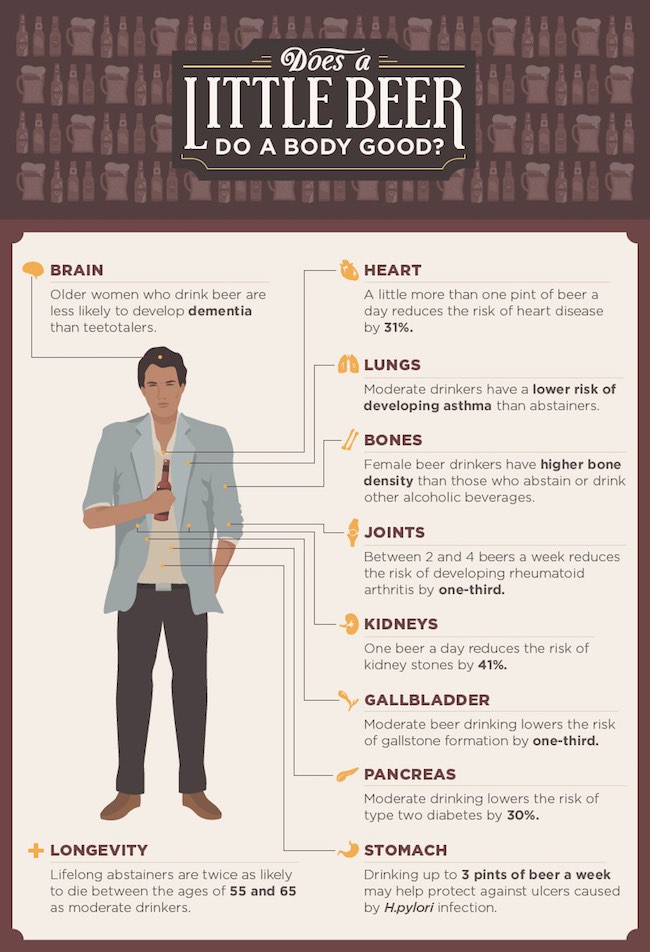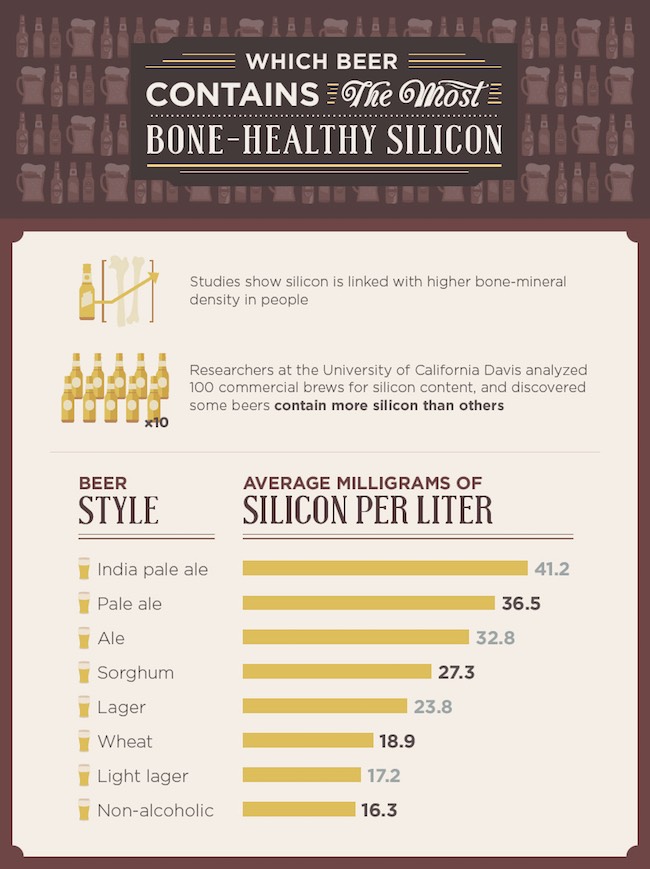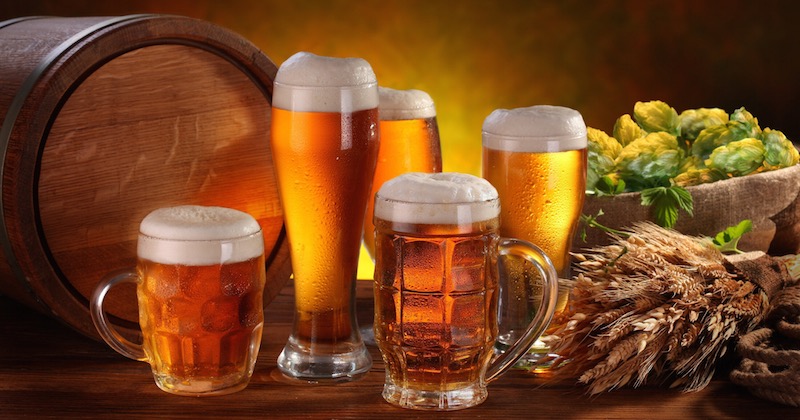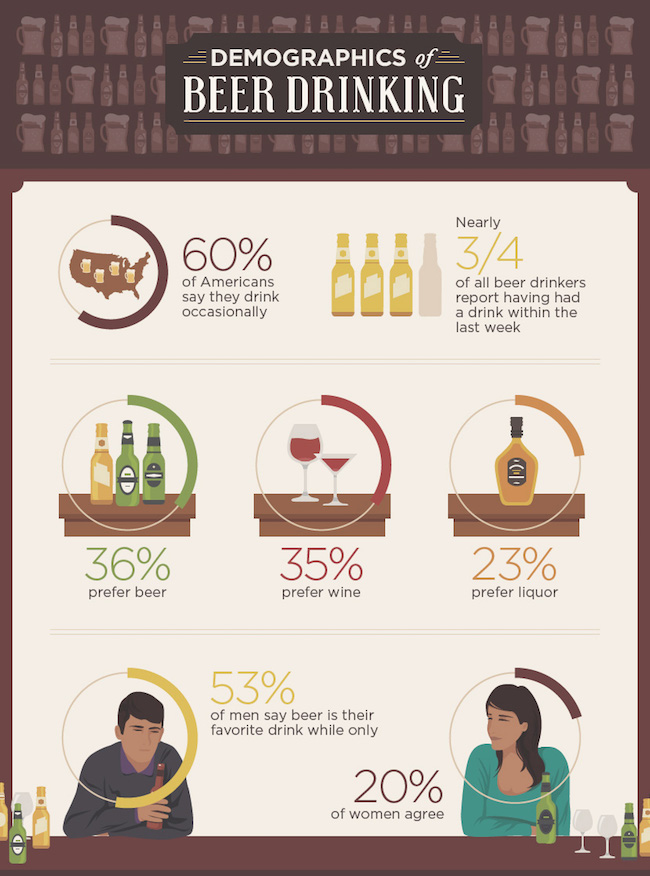The Surprising Health Benefits Of Beer—Backed By Scientific Studies!
Last updated on
Beer suffers from a bad rap. Red wine is often celebrated as a healthy beverage in moderation, but beer is put down as a fattening party drink. Despite this stigma, beer drinkers may want to raise a pint to their health.
A growing body of research suggests moderate beer consumption boasts a number of health benefits. Some studies even propose an IPA may be a healthier pick than a merlot.
Beware, though: Swilling too many pints likely counteracts many of the sudsy beverage’s benefits. Read on to sort through the encouraging research that may help you enjoy a microbrew guilt-free.
A Pint Of Vitamins And Minerals
Beer contains essential nutrients. This news may be surprising news, but remember, the beverage consists primarily of four healthful ingredients: fermented whole grains, bitter herbs, yeast, and water.
Nevertheless, most people do not realize beer contains the same number of antioxidants, more protein, and more B vitamins than wine.1 (A small Dutch study found vitamin B6 levels were 30 percent higher in beer drinkers than in non-drinkers.)2 Beer also contains magnesium, selenium, potassium, phosphorus, and biotin.3
Moreover, a University of California, Davis, study found beer provides both dietary fiber and prebiotics, non-digestible carbohydrates that act as food for probiotics and thus help to improve gut health.4 And beer contains significant amounts of silicon, a mineral considered essential for the health of bones and connective tissues. Research even suggests a daily beer may help maintain healthy bones.
A Bottle of Bone Health
The men in the Framingham Heart Study and Framingham Offspring Study, long-term examinations on residents of the town of Framingham, Massachusetts, consumed 20 to 33 percent more silicon than the women. Why? Because the men drank more beer.5
Women were not only ingesting less silicon, they were absorbing less of the silicon they took in. That is because the women primarily got their silicon from bananas and green beans, but the silicon in bananas is not well assimilated by the body.6 On the other hand, the silicon in beverages—such as the beer the men drank—is readily available.7 (In a separate study, subjects absorbed 65 percent of the silicon in a non-alcoholic beer versus 4 percent of the silicon in a banana.)8
The question is: Could a beer or two a day help a woman ward off osteoporosis? Maybe. In two studies, female beer drinkers had significantly higher bone density than those who did not drink beer.9 Researchers were not sure if the cause was beer’s silicon content, phytoestrogens, or another ingredient.
Health Benefits Of Beer – A Keg of Cardiovascular Benefits
All alcohol, in moderate amounts, is considered heart healthy and has been shown to raise good cholesterol levels and lower bad cholesterol levels in healthy individuals.10
Beer may be even healthier for the heart than other alcoholic drinks because it contains high levels of polyphenols, compounds that exhibit antioxidant, anti-carcinogenic, anti-inflammatory, estrogenic, and antiviral properties. These compounds may partly explain the growing number of studies suggesting beer has a healthy effect on the cardiovascular system.
- A large Kaiser survey found male beer drinkers were at a statistically significant lower risk of coronary-artery disease than were men who drank red wine, white wine, or spirits.
- A study of 70,000 female nurses found that those who drank a moderate amount of beer had less hypertension than those who drank either wine or spirits.11
- In a small Dutch study, beer was the only alcoholic beverage that did not raise levels of homocysteine, a non-protein alpha-amino acid linked with heart disease.12
- Drinking beer acutely improved the function and structure of the arteries in a small study of healthy non-smokers.13
- In a study of 48 men with existing heart disease, half drank one beer a day for a month while the rest drank mineral water.14Eighty-eight percent of the beer drinkers experienced positive changes in blood chemistry, including a “decrease in ‘bad’ cholesterol, an increase in ‘good’ cholesterol, an increase in antioxidant levels, and a decrease in levels and activity of fibrinogen,” a clot-producing protein.
Beer Belly and Breast Cancer Caveats?
Moderate beer drinking seems to provide some health benefits, but it is important not to ignore possible risks. Beer, especially varieties with high alcohol content, can be high in calories, which is why it is probably blamed for abdominal obesity.
The good news is, fears about acquiring a beer belly are likely overblown. A review of 47 different studies found inadequate scientific evidence to associate beer intake at moderate levels with general or abdominal obesity.15
However, researchers have repeatedly found a link between moderate alcohol consumption and breast cancer. A meta-analysis combining the results of 98 studies found that women who drink just one serving of alcohol a day are 11 percent more likely than non-drinkers to get breast cancer.16
It sounds scary, but the actual risk is very low. According to one analysis, women in their 50s have a 2.38 percent risk of developing breast cancer, and drinking three to six beverages per week would change this risk to about 2.7 percent.17
Moreover, many of the studies are based on self-reported data and do not differentiate between daily drinking and binge drinking.18 Besides, researchers did not specifically look at beer, and there is reason to think beer’s relationship to cancer may be different than other beverages.
Some researchers theorize the reason alcohol may be linked with increased breast cancer risk (as well as an increased risk for developing certain cancers in male smokers) is because it depletes folate levels.19, 20 However, drinking beer can actually increase folate levels because of its high B-vitamin content.21 Of course, another mechanism (such as phytoestrogens) could be to blame for alcohol’s correlation with breast cancer. Thus, more research is needed.
There is an important question to ask about all of the available research on alcohol and health: Is any of it reliable enough to steer lifestyle decisions?
Research Limitations
Not all health researchers are convinced by numerous studies suggesting moderate alcohol intake is healthy. Some scientists point out that the alcohol industry has ties to some academic centers where research is conducted.
Moreover, the studies showing alcohol’s benefits are not blind, randomized, controlled clinical trials, which is the gold standard of health research. These critics theorize the studies merely reflect that people with better health and greater financial resources are more likely to drink, not that alcohol is the cause of their improved health.22
Other observers believe alcohol is linked to positive health effects, but not because of any key ingredient.23 Rather, they say alcohol encourages relaxation and social connections, both of which foster good health.
So what is a non-drinker to do? Visit the pub or abstain? The Centers for Disease Control and Prevention (CDC) advises non-drinkers should not start drinking because of perceived health benefits. And every expert agrees that drinking too much is unhealthy.
A Mouthful of Moderation
Moderate drinking may be okay, but excessive and binge drinking is not. Drinking too much is associated with increased morbidity and mortality, as well as an increase in work-related and traffic accidents. Moreover, many health benefits, such as higher bone density and cardiovascular health, change course when drinking exceeds moderate levels.
What are moderate levels? The CDC defines alcohol consumption as follows:
Moderate:
- Up to one drink per day for women
- Up to two drinks per day for men
Heavy:
- 8 drinks or more per week for women
- 15 drinks or more per week for men
Binge:
- 4 or more drinks on a single occasion for women
- 5 or more drinks on a single occasion for men24
We are not advising you to trade in a green smoothie for an oatmeal stout. However, moderate beer drinkers can toast to a growing body of research suggesting their favorite sudsy beverage can be part of a healthy lifestyle.
References:
Original article: https://www.fix.com/blog/health-benefits-of-beer/
Republished here with permission.
- https://www.ncbi.nlm.nih.gov/pubmed/11093684
- https://www.aim-digest.com/gateway/pages/heart/articles/beerb6.htm
- https://allaboutbeer.com/article/beer-as-good-food/
- https://www.asbcnet.org/publications/journal/vol/abstracts/ASBCJ-2007-0306-01.htm
- https://ajcn.nutrition.org/content/75/5/887.full
- https://medherb.com/Materia_Medica/Equisetum_-_Silicon_in_horsetail_and_comfrey.htm
- https://www.ncbi.nlm.nih.gov/pmc/articles/PMC2658806/
- https://www.ncbi.nlm.nih.gov/pmc/articles/PMC2744664/
- https://naturalmedicinejournal.com/journal/2010-04/beer-drinking-and-bone-density
- https://www.ncbi.nlm.nih.gov/pubmed/17440017
- https://www.cbsnews.com/news/beer-a-health-booster/
- https://www.ncbi.nlm.nih.gov/pubmed/10801179
- https://www.ncbi.nlm.nih.gov/pubmed/23810643
- https://www.sciencedaily.com/releases/2003/01/030101223233.htm
- https://www.ncbi.nlm.nih.gov/pubmed/23356635
- https://ww5.komen.org/BreastCancer/Table3Alcoholconsumptionandbreastcancerrisk.html
- onemedical.com/blog/live-well/alcohol-risk-of-breast-cancer
- https://www.niaaa.nih.gov/research/niaaa-research-highlights/scientists-rethink-alcoholbreast-cancer-relationship
- https://www.hsph.harvard.edu/nutritionsource/alcohol-full-story/
- https://www.drwhitaker.com/can-alcohol-really-increase-risk-of-breast-cancer/
- https://www.ncbi.nlm.nih.gov/pubmed/11464234
- https://www.nytimes.com/2009/06/16/health/16alco.html?_r=2
- https://www.wired.com/2010/09/why-alcohol-is-good-for-you/
- https://www.cdc.gov/alcohol/faqs.htm
Some of the links I post on this site are affiliate links. If you go through them to make a purchase, I will earn a small commission (at no additional cost to you). However, note that I’m recommending these products because of their quality and that I have good experience using them, not because of the commission to be made.














 JOIN OVER
JOIN OVER
Comments